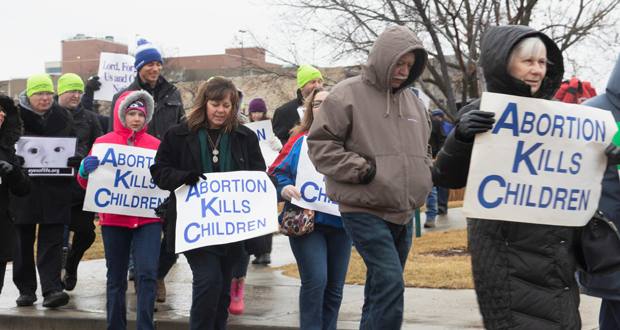For a decade-plus, Kansas lawmakers worked to create increasingly strict regulations on abortion. Pro-life forces pushed many of the rules, saying they were needed to keep clinics, and the women who use them, safe. Abortion rights factions fought those rules at virtually every turn, contending the laws meant to harass clinics out of business.
Those laws came under repeated, and still pending, legal challenges. Then last year the Kansas Supreme Court “found” that the state constitution contains abortion rights. Now conservatives in the Legislature want to amend the Kansas Constitution to reverse that court ruling.
After being approved by the Senate, the vote in the Kansas House fell four votes short this week. So pro-life forces will have to try again if they want to send the issue to voters in August or November.
Even though 80 of 84 Republicans voted in favor, it was these four Republicans who got the attention, as their votes changed the outcome:
- Rep. Don Hineman (NW Kansas) — (785) 296-7384
- Rep. Jan Kessinger (Overland Park) — (785) 296-7436
- Rep. Bill Pannbacker (NE Kansas) — (785) 296-7637
- Tom Phillips (Riley County) — (785) 296-7402
“Last year, five activist judges sitting on the Kansas Supreme Court struck down a 2015 ban on the dismembering of children still in the womb,” said Barbara Saldivar, State Director of CWA of Kansas. “These five activist judges ruled unconstitutional a law that outlawed the medical practice of dismemberment abortion where doctors knowingly dismember a living unborn child by extracting the unborn child one piece at a time from the uterus.”
Without passage of the amendment, a string of laws focusing on abortion regulations in the state may be at risk:
The 22-week cutoff: In broad strokes, it doesn’t allow a few key abortion methods and women generally can’t get abortions after 22 weeks of (or slightly more than halfway through) pregnancy.
Being the victim of rape or incest doesn’t get women out of those rules. Kansas makes some exceptions for pregnancies that go very wrong and could kill the mother or do her serious physical harm.
Parental permission: Anyone under 18 seeking abortion needs written notarized permission from both of her parents. But there are several exceptions, such as if she is married, her parents are divorced, or she was the victim of incest by her father. Minors can ask a judge to waive the parental permission law.
Unless it’s an immediate medical emergency, minors must meet with a counselor and take along a parent or someone over the age of 21 with an interest in their wellbeing and no affiliation with the abortion facility. The conversation should include talking about abortion and alternatives.
Child rape: Kansas law defines sex with someone under the age of 14 as rape. If a child is under 14 years old, the doctor must turn over fetal tissue from her abortion to the Kansas Bureau of Investigation, together with the names of her parents.
No D&E: Dilation and evacuation — also called “dismemberment abortion” — is the most common procedure after 13 weeks of pregnancy, according to the American College of Obstetricians and Gynecologists. The law bans dismemberment abortion except to save a mother’s life or stop serious and permanent damage to her bodily functions.
The abortion pill: About 60% of abortions in Kansas involve this pill, and at least one of the state’s four clinics has used doctors in other states to guide women through the process remotely by video while they sit in the clinic. A Kansas law tied up in court bans that.
Abortion licensure: Abortion clinics in Kansas must get a license from the state each year. That, pro-life activists say, keeps patients safe. The clinic rules touch on everything from lavatories to staffing to annual equipment checks and surprise inspections.
Public money for abortion: No using the State General Fund and other types of state revenue for abortion, and state employees can’t perform them. That includes the University of Kansas Medical Center. Faculty can’t do abortions on the clock or on university property. The sole exception: To save a woman’s life.
Private insurance and abortion: Health plans can’t cover costs from an abortion unless it’s to save a woman’s life. State law allows for purchasing a policy rider to cover it. (Separately, the federal Medicaid and CHIP programs pay for abortion in Kansas only to save a mother’s life or in cases of rape or incest.)
–kcur.org and Metro Voice News
House & Senate committees recommend state constitutional amendment
 Metro Voice News Celebrating Faith, Family & Community
Metro Voice News Celebrating Faith, Family & Community









